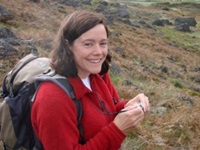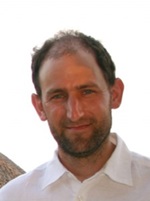
The National Biodiversity Data Centre is delighted to announce that Dr. Joanne Denyer and Dr. Tom Gittings are jointly to be awarded the Distinguished Recorder Award for 2014 at a special awards ceremony at the Royal Irish Academy, Dawson Street, Dublin 2 at 11:00hrs on Friday, 7th November.
More than 20 nominations were received for this year’s award, and the Data Centre is pleased to make this joint award in recognition to the outstanding contributions both Joanne and Tom have made to biological recording in Ireland.

Dr Joanne Denyer
Dr Joanne Denyer is one of Ireland’s few bryophyte specialists. Jo has made a significant contribution to our knowledge of bryophyte distributions in Ireland and worked across Ireland to enthuse others about bryophytes and their recording. She was inspired to take up botany by Professor Clive Stace whilst she was an undergraduate at Leicester University. Whilst later completing a DPhil in Plant Ecology at the University of Sussex, she had her first encounters with bryophytes. Rod Stern encouraged her to join the British Bryological Society (BBS) and her interest in bryophyte grew from there. When she later moved to the Macaulay Institute in Aberdeen, to work on upland plant communities, she continued to develop her bryophyte knowledge through BBS field meetings, courses and self-teaching.
In 2008, Jo moved to Ireland to work as an ecological consultant and quickly became involved in leading bryophyte field meetings for the Dublin Naturalist Field Club (DNFC). The Heritage Council, BBS and DNFC supported two bryophyte recording projects she ran in 2010 and 2012 in Counties Wicklow and Kildare. The aim of these projects was to collect data in under-recorded areas and to train beginner bryologists to identify and record bryophytes. During this time she also founded the BBS Irish bryophyte group, which aims to develop bryophyte expertise in Ireland though field meetings and knowledge sharing. There is an annual programme of field meetings and an Irish Bryophyte Facebook page to share news and event details. She also helped to establish a network of BBS Regional Recorders in Ireland and there are now recorders for ten vice-counties. Jo regularly organises formal and informal recording meetings for the BBS in Ireland and Northern Ireland. From 2009 to 2013 this was focused on collecting data for the New Atlas of British and Irish Bryophytes, which is due to be published in November 2014. These meetings have resulted in nearly 60,000 bryophyte records, including over 1,000 New Vice County Records.
Jo currently works as an ecological consultant (Denyer Ecology), specialising in botany and bryophytes. In addition to consultancy work, she trains Ireland’s next generation of bryologists by lecturing in bryology at National University of Ireland, Galway and University College Dublin and is a Visiting Research Fellow at Queen’s University, Belfast. She is the BBS Regional Bryophyte Recorder for Counties Wicklow and Kildare, the BBS Irish Conservation officer and a member of the BBS Conservation and Recording Committee. She regularly provides bryological training courses in Ireland for amateurs and professionals.
None of this would have been possible without the support of BBS bryophyte experts and the dedication of Irish bryologists (in particular Neil Lockhart, Maurice Eakin, Rory Hodd and George Smith). Many experts have generously given their time to long recording days in Ireland helping to train Irish bryologists. The bryology community has provided inspiration, support, training and friendship.

Dr Tom Gittings
Dr Tom Gittings interest in natural history began at the age of 11 when his Grandfather gave him a gift of membership of the Young Ornithologists’ Club. He quickly became a keen birdwatcher and then expanded his interests into other fields of natural history. Tom completed a degree in Ecology at UEA (Norwich), with a final year dissertation on the Blue-tailed Damselfly, and then a PhD at UCC on dung beetles. On finishing his PhD, Tom worked for an environmental consultancy for five years, before returning to academia as a postdoctoral researcher for nine years. Since 2010, he has been working as an independent consultant. A major focus of his work during this time has been carrying out research into waterbird interactions with aquaculture and shellfisheries and preparing Appropriate Assessments of coastal SPAs using the results of this research.
Tom’s postdoctoral research gave him the opportunity to develop his entomological knowledge through the use of hoverflies and other invertebrate groups as indicator groups to study the biodiversity of forestry and wetland habitats. Tom was very fortunate to benefit from the immense expertise of Dr Martin Speight in learning to identify and understand hoverflies, and has tried to “pay it forward” by helping others with this fascinating and important group of insects. During his research he also studied a range of other invertebrate groups including spiders, snail-killing flies, soldierflies and moths. Since completing his research, Tom has continued to record hoverflies and other invertebrates. In recent years, he has focused a lot on recording solitary bees, and has begun to get to grips with solitary wasps, due to the prominence of these groups in the coastal habitats of east Cork where he lives.
Tom has been supporting the Data Centre since its establishment. He submits large numbers of personal records as well as anything collected professionally that is not under restriction. He acts as the national validator of hoverfly data submitted to the Centre. In 2014 Tom provided a full reference collection of hoverflies to the Centre for public use through the Centre as an identification resource. Tom also encourages insect recording through social media and collates records from Irish Facebook sites which he supplies to the Centre on a regular basis. Tom has also one of the longest standing volunteers on the Bumblebee Monitoring Scheme. Further details about Tom’s consultancy work and entomological recording are available at www.gittings.ie.





